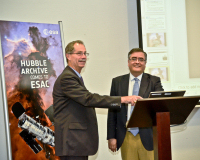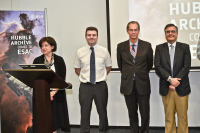European Hubble archive moves to Spain
22 June 2012
The European science archive for the NASA/ESA Hubble Space Telescope has been transferred to ESA's European Space Astronomy Centre (ESAC) in Villanueva de la Cañada near Madrid, Spain. This guarantees a permanent home for Hubble science data following the closure of the Space Telescope European Coordinating Facility (ST-ECF), located at the headquarters of the European Southern Observatory near Munich, Germany.
 |
|
Hubble archive moves to Spain |
Prof Álvaro Gimenez Cañete, ESA's Director of Science and Robotic Exploration said: "This year, European astronomers were awarded a record share of observing time with Hubble. Bringing the Hubble science archive to ESAC is part of ESA's continuing commitment to European astronomers having access to the world's most famous orbiting observatory."
In the latest allocation of observing time, in an open competition, European scientists were awarded 26.5% of Hubble orbits. Antonella Nota, ESA Hubble Project Scientist and Mission Manager explains: "ESA's agreement with NASA guarantees 15% observing time for European researchers over the lifetime of the mission. But to win over a quarter of the available time in a single cycle is unprecedented and shows that European scientists have a strong interest in Hubble, and continue to propose highly creative and competitive uses for Hubble's unique capabilities."
In the 1990s, the Hubble project was a pioneer in the development of science archives. While they might seem unglamourous, archives are a key part of maximising the utility of a scientific facility. Where observations used to be one-off experiments designed to answer one astronomer's needs, digital archives now allow data to be used again and again for widely-varying objectives, thereby multiplying the potential scientific productivity of a telescope. Observations in these archives become public typically a year after they were taken, allowing anyone free access, including interested members of the public.
Martin Kessler, Head of ESA's Science Operations Department said: "Archives are an increasingly important part of research in astronomy. By joining the state-of-the-art archives of other ESA astronomy missions like XMM-Newton, Herschel, Planck and ISO, we can guarantee that European researchers will maintain full and long-term access to Hubble data."
The ST-ECF was established in 1984 as a joint project of ESA and the European Southern Observatory (ESO) to support European users of Hubble. It also provided access to hubble science data before high bandwidth connections across the Atlantic made routine use of the US archive possible. A similar archive was set up in Canada by the Canadian Astronomy Data Centre. As the project evolved, the ST-ECF reinvented itself as an incubator for technological innovations, including the processing of Hubble slitless spectroscopic data.
 |
|
Opening ceremony |
After 26 years of service to the European astronomical community, the ST-ECF closed its doors in December 2010 (heic1019). ESO has continued to host the European Hubble Archive on a transitional basis, prior to its move to ESAC.
The migration of the archive to ESAC has an included integration into the hardware infrastructure of the other science archives already present there. Furthermore, all data from active HST instruments science data using the high-performance grid computing facilities at ESAC. All archive functionalities have been transferred, including the continuous processing of science data with the latest calibration software.
The integration of the European Hubble Archive with ESA's other astronomical science archives at ESAC is the final step in guaranteeing a permanent home for this important scientific resource. As such, ESAC will now be the sole European location for the comprehensive archive of Hubble science data.
ESAC is the home of the science operations for ESA's astrophysics and solar system missions, and where the scientific data produced are archived and made accessible to the world. It currently hosts the archives of most of ESA's missions in astrophysics (XMM-Newton, Herschel, Planck, INTEGRAL, ISO and Exosat) and solar system science (Mars Express, Venus Express, Rosetta, SMART-1, Huygens, Giotto, SOHO). The archives of the Cluster and Ulysses missions are also currently being migrated to ESAC and future missions such as Gaia, Euclid, BepiColombo, Solar Orbiter and JUICE will also have their archives located there.
Contacts
Antonella Nota
Space Telescope Science Institute and European Space Agency, Baltimore, USA
Email: nota stsci.edu
stsci.edu
Phone: +1-443-823-2760
Martin Kessler
ESA Science Operations Department, Villanueva de la Cañada, Spain
Tel: +34-91-813-1253
Email: martin.kessler esa.int
esa.int
Oli Usher
Hubble/ESA, Garching, Germany
Email: ousher eso.org
eso.org
Phone: +49-89-3200-6855
Markus Bauer
ESA/ESTEC, Noordwijk, Netherlands
Email: markus.bauer esa.int
esa.int
Phone: +31-71-565-6799

